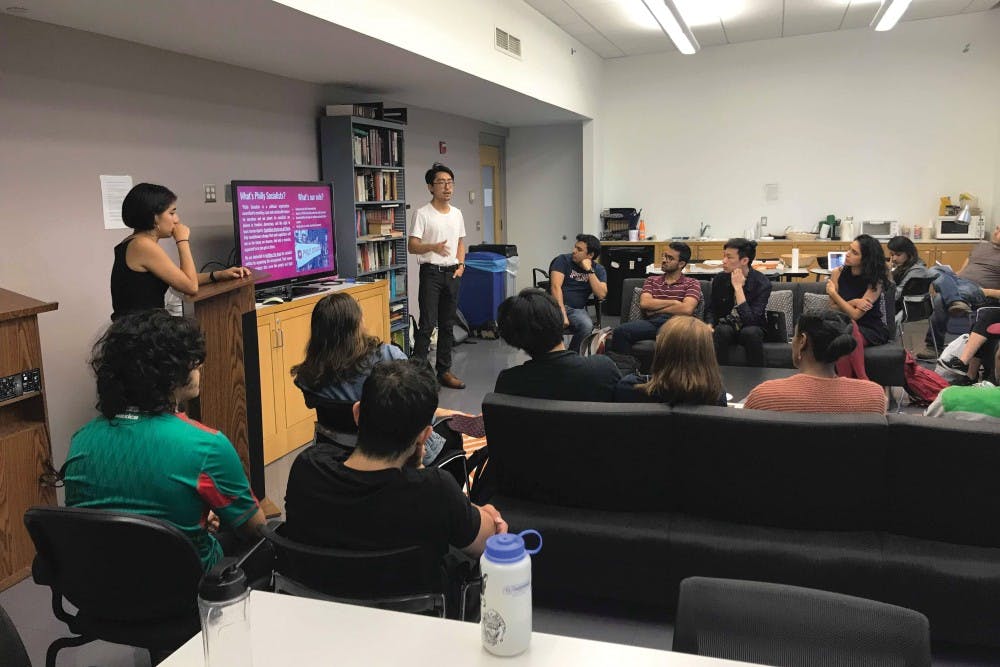At six p.m. on Friday night, about 20 undergraduate and graduate students assembled in room 330 of Fisher Bennett Hall for the first general body meeting of Penn Socialists, an on-campus socialist organization united under the shared vision that humanity is unsustainable under capitalism.
Penn Socialists is trying to bring themselves back onto the radar of the Penn community, after a separate club of the same name ceased to exist after its leadership graduated. The club is a 2018-2019 University-recognized group open to students, faculty, and staff.
This is not the first time there has been a socialist resurgence on campus. In 1992, a group of 10 students founded the University’s chapter of the Democratic Socialists of America. Then, in 2016, Students for a Democratic Society made a comeback on campus, after the group's initial debut during the Vietnam War. However, College sophomore and founding member of Penn Socialists Shana Vaid said that the difference between Penn Socialists and other political groups, including Democratic Socialists, is their lack of adherence to party systems and the overall institution of capitalism.
Unaffiliated with previous socialist efforts, Penn Socialists said it is bringing ongoing education and activism to the Penn community. The group operates under four “Points of Unity" — abolition, internationalism, intersectionality and nonsectarian.
The group was formed by a group of nine Penn undergraduate and graduate students who connected over the summer through broad involvement with Philly Socialists, the organization responsible for this summer’s Abolish ICE and Prison Strike movements in Philadelphia.
While Penn Socialists will function independently of Philly Socialists, the two groups will collaborate on projects, said College sophomore and founding member of Penn Socialists Ivanna Berrios.
At their core, Berrios said, Penn Socialists is a vehicle for ideological liberation and coordinating action at Penn, all while supporting global efforts in activism in solidarity with pre-existing institutions.
“We want to build solidarity with Philadelphia,” they said. “We do not claim or intend to be saviors but instead will work supplementary to existing institutions.”
Related:
Philadelphia's ICE Office is one of the nation's most aggressive, according to report
Graduate student, 38, died Tuesday night after suffering medical emergency in class
Penn forms committee to select new Dean for the School of Social Policy
Penn Socialists have already identified a key issue on Penn’s campus: the administration’s involvement with West Philadelphia, particularly regarding to the public school system and their involvement with Civic House and The Netter Center.
“[The] structural issue is that Penn doesn’t pay taxes and that’s why these schools are struggling. Having students tutor is like a band-aid that doesn’t actually fix the actual issue, which is that these schools are underfunded in part because of Penn,” Vaid said.
Vaid was referring to the fact that Penn does not pay PILOTS, or monetary contributions that nonprofits voluntarily make to pay for essential services like fire and police protection, trash pick-up and road maintenance. Penn and Columbia are the only two Ivy League schools that do not provide PILOTs to their local governments.
In the past, Penn has claimed that although PILOT payments have ceased, the University continues to contribute economically to the welfare of the region. Annual financial contributions nearing $2,000,000 are delegated to the Netter Center and Penn Alexander School.
Though an official list of intended projects has not been assembled, the group has begun to identify other potential issues on campus to address in the upcoming year. The relationship with the West Philadelphia community remains at the core of these issues, but Penn’s influence as a national and global player will not be ignored.
“Penn is very powerful and Penn has to be attacked. Penn is not just a university, it is a corporation. Penn is an oppressor,” Berrios said.
Toorjo Ghose, a professor in the School of Social Policy and Practice, has worked closely with socialist efforts in Philly for the past few years. He is not a member of Penn Socialists but believes their activism has an important place on campus.
“[Penn] displace[s] every gender and race and member of socioeconomic class yet we are exempt from property taxes,” Ghose said. “In terms of activism, [it's] never more important [than] the time we’re in now, when activism on the left is reason our society survives."









